Author Archives: admin

AU Libraries Commitment to Anti-Racism and Anti-Oppression
Alfred University Libraries stand in solidarity with Black Lives Matter and global movements responding to the systemic racism and anti-Black violence that recently claimed the lives of Breonna Taylor, George Floyd, Ahmaud Arbery, Tony McDade, and innumerable others. We recognize that this movement is intersectional and essential to dismantling oppression. We appreciate and endorse the statements of Alfred University and the American Library Association, which show support for all marginalized communities, especially the BIPOC (Black, Indigenous, People of Color) community.
Affirming that Black Lives Matter engages with our Libraries’ value of supporting “intellectual and cultural diversity” and recommits us to the strategic goals of recruiting and retaining “a diverse and talented staff” and to developing “library programming that makes the libraries a center for intellectual discussion.” We recognize, however, that this is not enough.
The Libraries acknowledge that an ongoing history of oppression occurs not just in areas such as policing, housing, employment, and healthcare, but also in library services, where there are many examples of libraries being complacent or complicit in the oppression of BIPOC. Alfred University Libraries do not claim immunity from complicity in this history of systemic racism.
Current events show us that unvoiced support for marginalized communities is only slightly better than no support at all, so we are actively adding our voice. However, this is only the first step. We also commit to “walking the walk” in order to create a more equitable, inclusive, and empowering environment, and a more just society. As a start, we will take the following concrete steps:
Creating a more inclusive environment:
- Solicit feedback from students on “What would make you feel more welcome and/or comfortable in the Alfred University Libraries?” Partner with the Institute for Cultural Unity to ensure students from marginalized groups are aware that we are asking for their feedback.
- Require all library personnel to participate in implicit bias and bystander intervention training (see Appendix).
- Strongly encourage library personnel to participate in Psychological First-Aid (PFA) and Safe Zone training (see Appendix).
- Evaluate the library search and hiring process to reduce bias and increase equity and to incorporate best-practices.
- Integrate anti-racist and/or anti-oppression values and language into the AU Libraries Mission, Vision, and Values.
Creating more inclusive collections:
- Actively add the work of BIPOC scholars to library collections.
- Add resources to support anti-oppression research and work to library collections.
- Solicit suggestions from students on collecting library materials by and/or about BIPOC.
- Whenever possible, ensure that library displays include works by marginalized creators/authors.
- Expand collaboration with student groups for library displays and events.
Educating ourselves:
- Begin a discussion group for library personnel focusing on works from a list of anti-racist resources or a list of anti-oppression readings focused on libraries and librarianship (see Appendix).
- Create a resource guide focused on anti-oppression (see Appendix).
We commit to regularly evaluating our progress and continuing to build on this statement and commitment. We welcome input from our patrons and our community on additional steps we can take as we work toward improving ourselves as professionals and as the Alfred University Libraries.
Appendix: Example Trainings and Resources
To guide the implementation of the actionable steps in our commitment, Alfred University Libraries recommend these examples and resources to be used as appropriate.
- Implicit bias training may include gender and sexuality issues but should also include racial issues such as micro and macroaggressions. One such example is UCLA’s “KNOW” Implicit Bias. This page provides a video series and modules as well as scholarship and additional videos.
- Bystander intervention training equips trainees with the training necessary to intervene in situations of harassment and hate violence. One recommended resource is the Southern Poverty Law Center’s guide to bystander intervention.
- Psychological First Aid (PFA) trainings equip trainees to respond to disasters and other traumatic events that affect a community by focusing on safety, stabilization, and connecting people to helpful resources. The American Psychological Association has compiled lists of resources and PFA providers.
- Safe Zone trainings create the opportunity to learn about different identities, particularly LGBTQIA+ people and the prejudices that they face. One example of Safe Zone training is provided by the Safe Zone Project.
- Lists of anti-racist resources take many meaningful forms. One example of a list that pertains directly to higher education was compiled by #ShutDownSTEM.
- Anti-oppression readings focused in libraries have a rich history. One exemplary compilation of readings is University of Wisconsin-Madison’s Disrupting Whiteness in Libraries and Librarianship: A Reading List.
- Anti-oppression resource guides are helpful tools for guiding students and faculty toward understanding oppression and the ways that they can combat it. Examples of such guides created by libraries include Anti-Oppression Resources for UNLV Students, Simmons University Library Anti-Oppression LibGuide, and this scaffolded list.

Libraries response to COVID-19
As of Wednesday, March 18, Herrick Library and Scholes Library are closed for an indefinite period of time.
Even though our buildings are closed, the Alfred University Libraries are still here to assist you!
The Herrick Library and Scholes Library webpages remain the gateway to millions of articles, ebooks, videos, databases, and other resources, most of which are not freely available elsewhere.
In addition, we have created a guide for Alfred University Libraries Remote Support that contains the most essential information for connecting with our resources, services, and people, including:
– Tips for accessing electronic resources remotely
– Accessing our print collection
– Accessing materials on Reserve
– Continuation of Library Instruction to classes and one-one research assistance
We will continue to update our online guide with additional information throughout the remainder of the Spring semester.
Please feel free to reach out to us with your questions and needs at libraries@alfred.edu. We are here to support you and help you have a successful semester.
The Alfred University Librarians and Library Staff

Coronavirus: Reliable Information Sources
The following organizations are recommended as reliable sources for accurate and up-to-date information about the novel coronavirus (COVID-19) outbreak:
New York State Department of Health
Centers for Disease Control and Prevention
World Health Organization

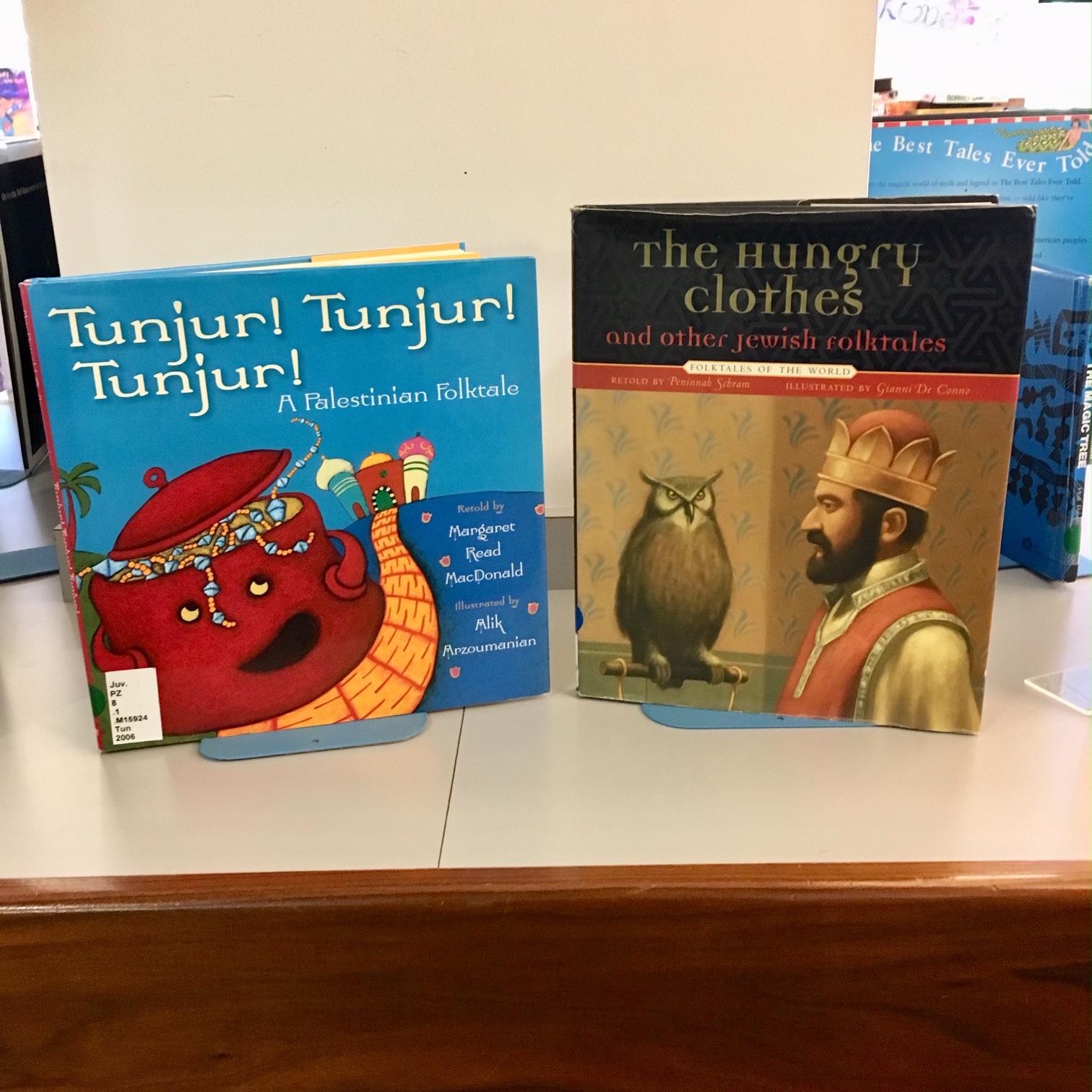
Building Inclusive Community Through Diversity and Anti-Bias in Children’s Literature
Herrick Library is hosting an exhibit organized by Professor Susan Morehouse and students in English 217, Blood, and Guts and Alphabets: The Gory Truth about Children’s Literature.
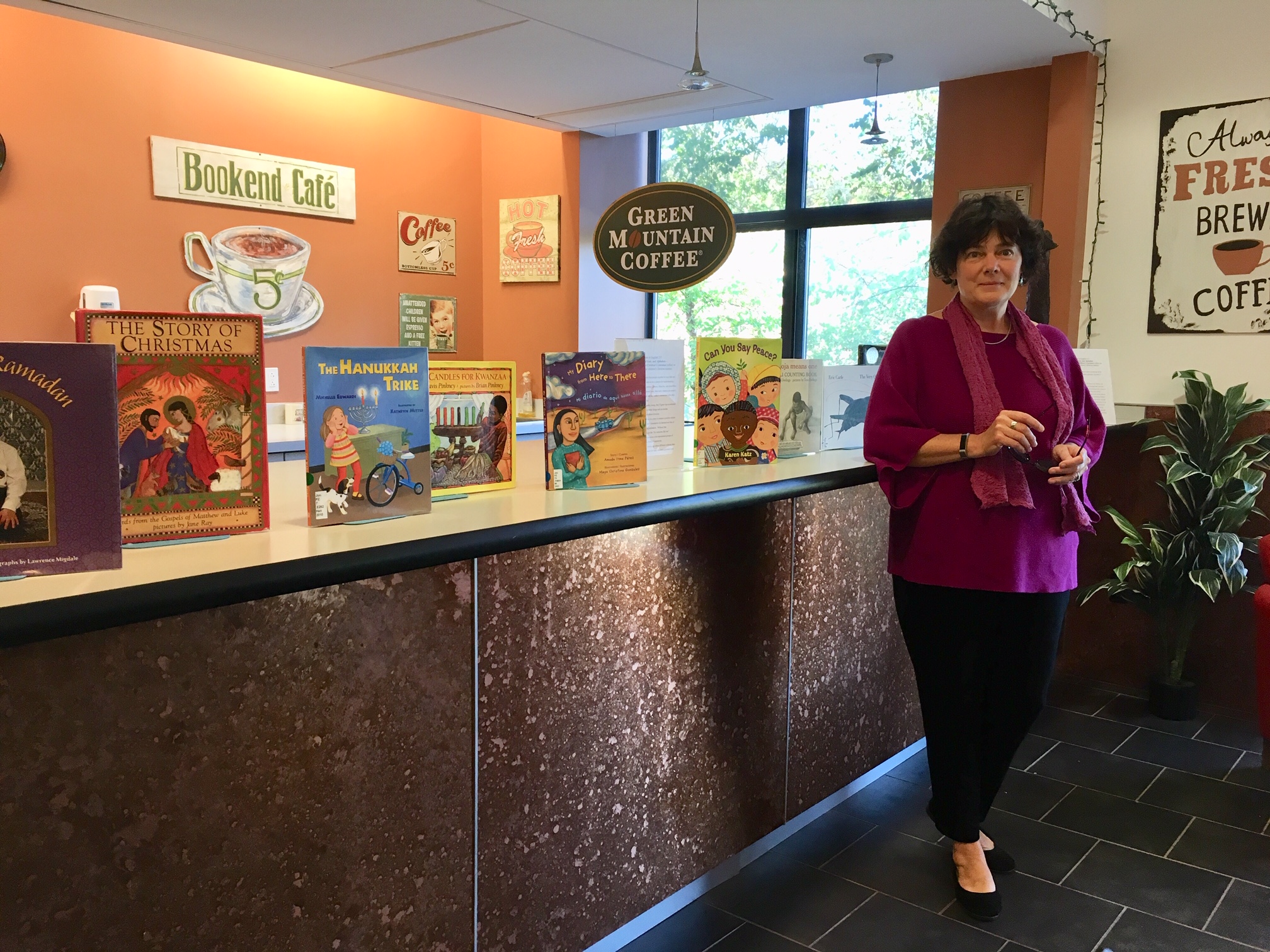 The exhibit includes books from Herrick Library’s Children’s Collection, selected for their demonstration (in both text and images) of diversity and anti-bias in early literature for children.
The exhibit includes books from Herrick Library’s Children’s Collection, selected for their demonstration (in both text and images) of diversity and anti-bias in early literature for children.
The students stated, “We believe that if children learn appreciation for other people, cultures, places, and beliefs alongside their abc’s they will have the power to change the world.”
As part of the group project and exhibit, the students developed “5 Do’s for Creating an Anti-Bias Early Reader Library.”
DO the books in your library reflect diverse cultures and diverse lifestyles?
- Do they show the values and beliefs of different cultures that reflect the contemporary world? Do they inspire students to learn more about diverse cultures? Is history also accurately represented?
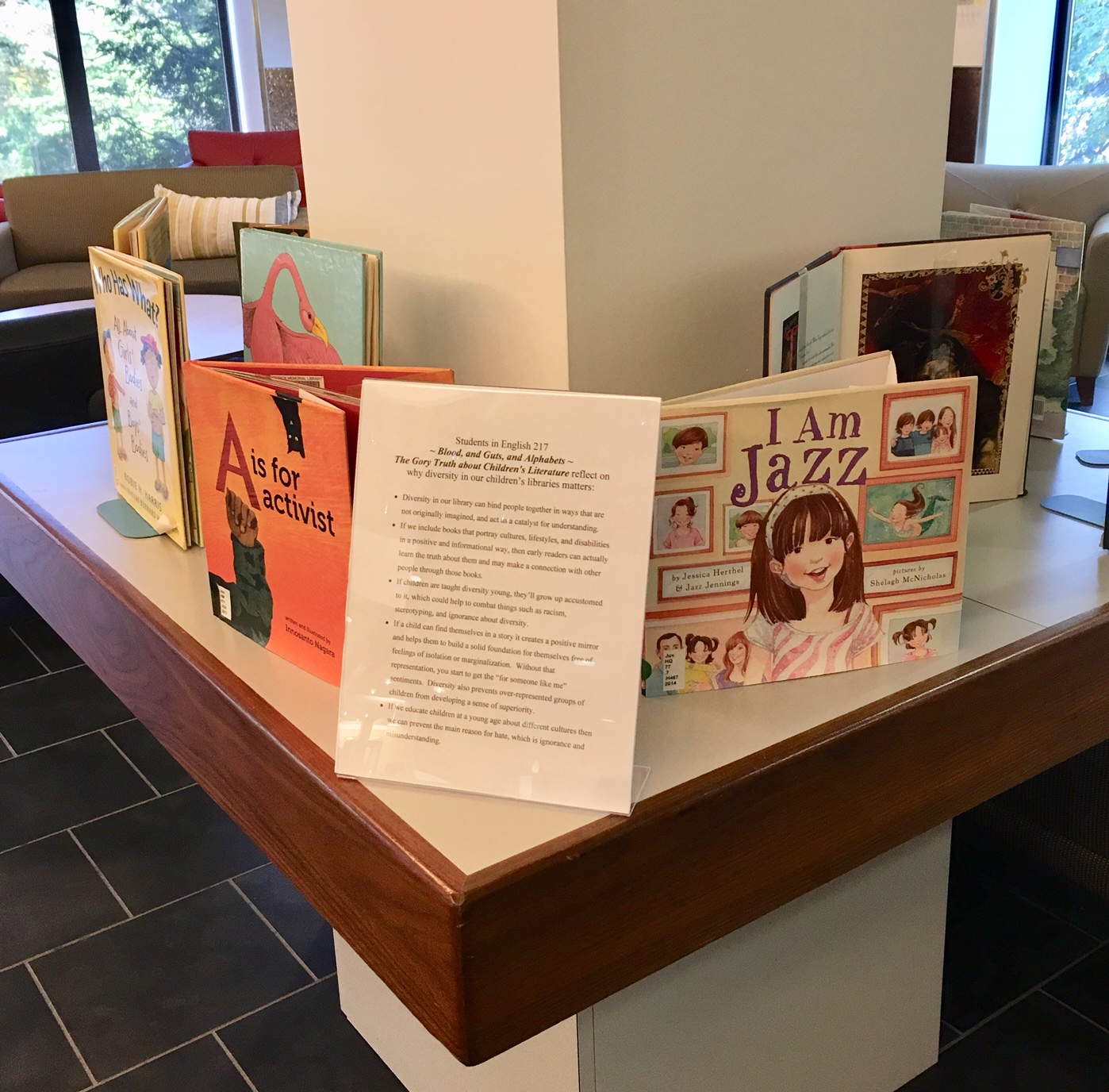 DO the books in your library reflect the truth of cultures, lifestyles, and abilities?
DO the books in your library reflect the truth of cultures, lifestyles, and abilities?
- Do they avoid injurious or demeaning stereotypes? Do they avoid tokenism, showing a diversity of cultures and abilities as a regular part of life?
DO your books include authors from a variety of different backgrounds, cultures, and ethnicities?
- Do they include the visions and voices of writers and artists of diverse cultures?
DO the books in your library cover people, places, cultures, etc. in your everyday life?
- Do they show women and men, and girls and boys, in non-traditional or non-gender-typed roles?
DO you have a wide variety of family dynamics visible in your library?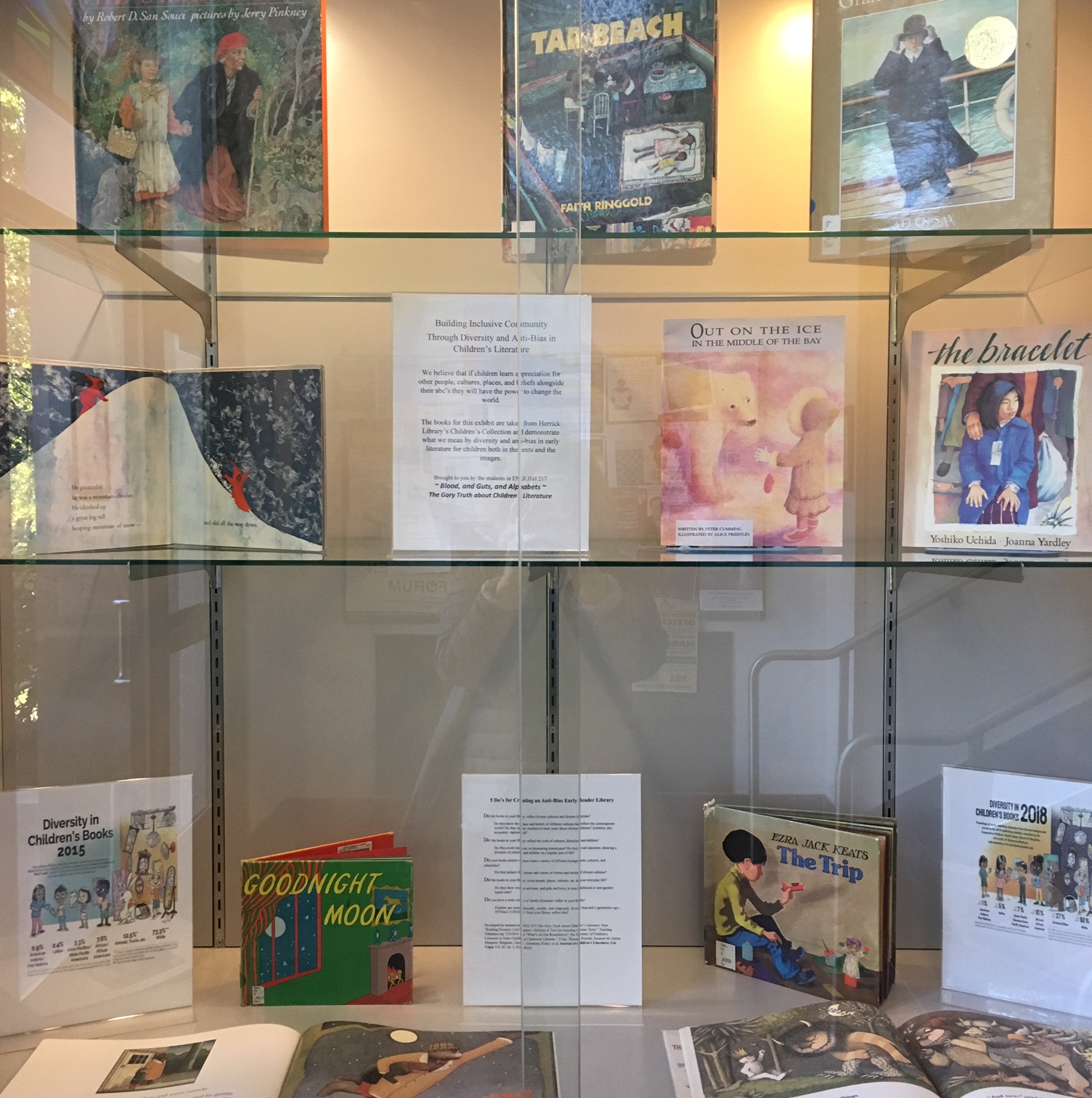
- Families are more ethnically, racially, and religiously diverse than half a generation ago. Does your library reflect this?
The books and related documentation will be on exhibit in Herrick through the end of the fall 2019 semester.
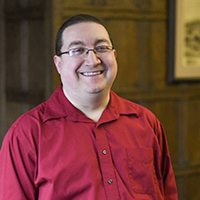
Brian Sullivan appointed dean of libraries
Alfred University announces the appointment of Brian Sullivan to the position of dean of libraries. Sullivan, who had been serving since 2018 as interim director of libraries, takes over for Steve Crandall, who retired after a 41-year career at the University.
Sullivan has been at Alfred University for 11 years, serving as instructional librarian at Herrick Library from 2008-12 and as information literacy librarian, also at Herrick Library, from 2012-18.
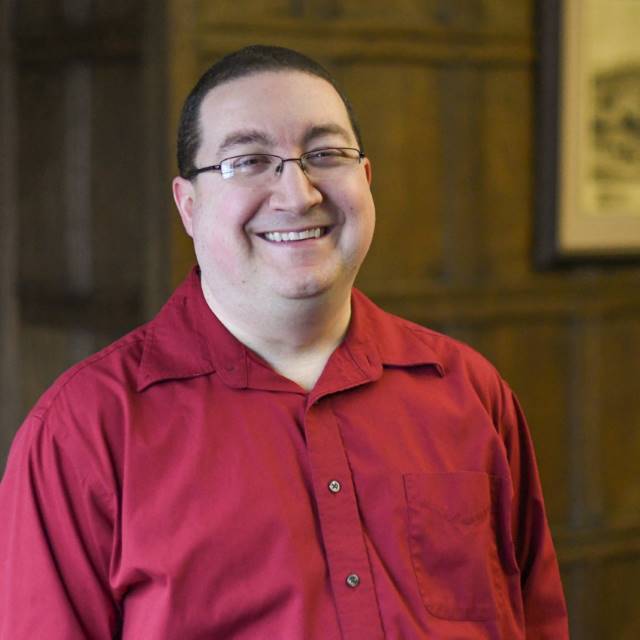
As interim director, Sullivan’s responsibilities included: managing all day to day operations; collaborating with Crandall to co-lead the strategic planning and assessment process; assisting the dean with managing the libraries budget; facilitating professional development for library faculty and staff; and coordinating all aspects of general library operations and facilities management.
His duties as instructional and information literacy librarian included leading development of the Alfred University Libraries reorganization plan; managing the library’s instructional program; chairing the Libraries Assessment Team; and leading the Task Force on Information Literacy and Assessment.
Sullivan earned a bachelor’s degree in English from SUNY Fredonia in 2000 and a Master of Library Science degree from the University at Buffalo in 2003.
He has taught a variety of library instruction sessions at Alfred University since 2008, including Writing I and II and First Year Experience, and in 2014 and 2015 taught an honors course, Create Your Own Religion.
Sullivan came to Alfred University in 2008 from Ave Maria University, Ave Maria, FL, where he was head of Public Services from 2006-07 and instructional services and electronic resources librarian from 2005-06. He was librarian at Hamlin (NY) Public Library for a year, in 2003.
Sullivan earned a master’s degree in theological studies from the Northeastern Seminary at Roberts Wesleyan College in 2002. He served as a theological library consultant at the Golisano Library, Northeastern Seminary at Roberts Wesleyan, from 2016-18. He also served as an instructor at the Seminary during those years, teaching classes in library research for Seminary students and leading Doctor of Ministry dissertation workshops and new graduate student library orientations. His prior teaching experience also includes new graduate student orientations and graduate theology library orientations at Ave Maria University.

AU Libraries announce upcoming systems migration
The AU Libraries are pleased to announce an upcoming systems migration in early July that will improve services to the campus. A new library services platform, called Alma, manages all of the libraries’ back-office functions, including circulation, the acquisition and cataloging of print and electronic resources, and resource sharing within SUNY.
The library staff have been working over the last year to prepare for this transition. While we expect disruptions to be minimal, we appreciate your patience and understanding as we make this upgrade.
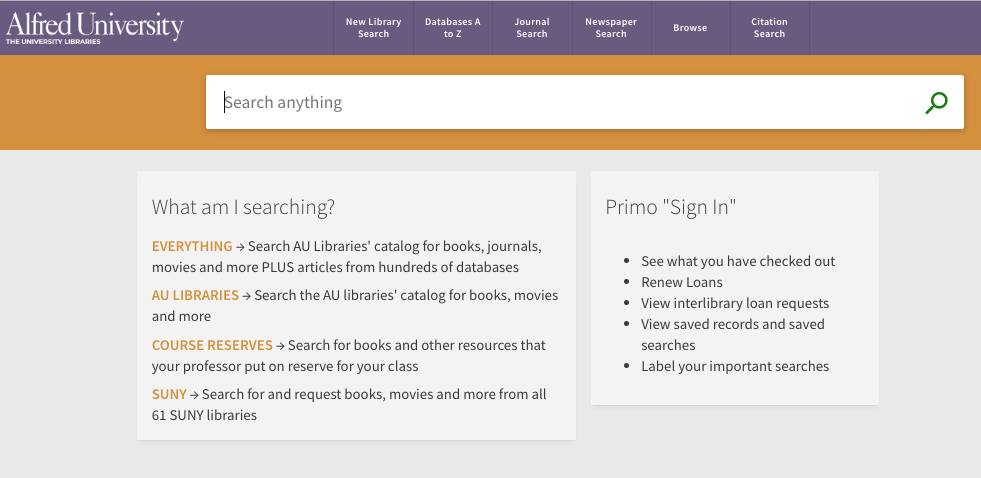
Library patrons will have access to an improved public search interface called Primo which has several new features:
* Mobile-friendly design
* An integrated search of physical and print materials at both Scholes and Herrick (videos, articles, books, databases, etc.)
* The ability to save favorite searches or articles as well as manage personal accounts for renewals and other circulation functions
* The ability to search across the collections of all SUNY Libraries (and beyond) with links to request materials for inter-library loan
If you have any questions, please feel free to ask any of the librarians.
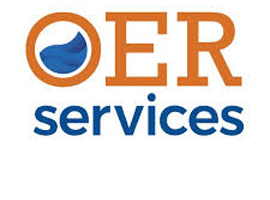
OERs: Helping to bring down the cost of textbooks
In the spring of 2017, the Alfred University (AU) Libraries conducted surveys of students and faculty about textbooks.
Below are some of the highlights from the surveys. You can view a complete summary of the results here.
Student Survey
- 20% of students spend $0-$100 per semester on textbooks, 52% spend $101-$300, 20% spend $301-$500, 7% spend $501-$800.
- Students reported that the high cost of textbooks has caused them to not purchase the text (47%), to charge texts to credit card even though they can’t afford them (25%), to forego essentials such as food or rent to pay for texts (23%), or to earn a poor grade because they could not afford the text (15%).
- 53% of students say that the high cost of textbooks sometimes prevents them from doing readings or assignments, and 11% say that it frequently prevents them from doing readings or assignments.
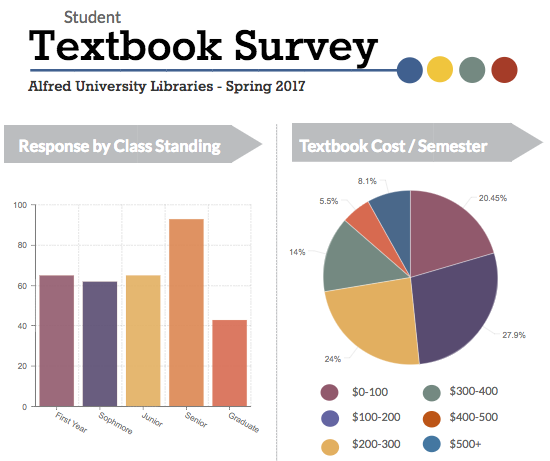
Faculty Survey
- 55% of faculty said that students occasionally tell them that they can’t afford the textbook for their class, and 20% of faculty said that students tell them this frequently.
- 55% of faculty had not heard of OERs prior to taking the survey, 10% of faculty say that they have assigned open textbooks in the past, and 9% were unsure.
- Faculty say that not knowing enough about OERs is the biggest barrier to using them, followed by a lack of OER resources in certain subject areas, concerns about quality, and not knowing where to find OER material.
- 60% of faculty say that they might be interested in using currently available OERs, and 27% say that they are definitely interested.
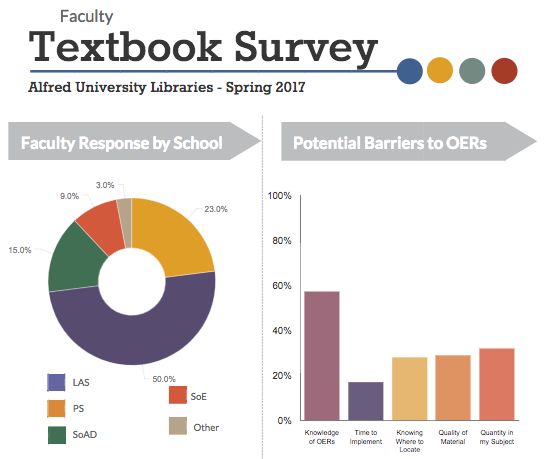
Since conducting the survey, the AU Libraries have engaged in a variety of activities to make faculty more aware of the impact of the cost of textbooks on our students and to share information about opportunities to use OERs in place of traditional textbooks.
Here are some of the steps we have taken:
- We shared the results of the surveys at a spring 2017 meeting of AU faculty.
- We developed some resources for faculty to make it easier for faculty to find Open Educational Resources.
- We are participating in a program sponsored by the State University of New York (SUNY) that provides stipends to faculty who adopt OERs as textbooks. A handful of faculty are participating in the program and we hope to grow
 participation going forward.
participation going forward. - We have encouraged faculty to put textbooks and other required readings on reserve at Herrick and Scholes Libraries.
- We have had some conversations with the bookstore about student concerns regarding the cost of textbooks and how we might collaborate around OERs.
Our goal is to continue raising awareness about the high cost of textbooks and the impact it has on students’ wallets and academic success. As always, we welcome your input and feedback.

Alan Littell: Ruminations on Local History
The following article, by Alan Littell, appeared in a recent issue of The Alfred Sun; it is reproduced here with his permission. Additional issues of The Alfred Student are available in Alfred University’s institutional repository, AURA (Alfred University Research and Archives). Managed by the libraries, AURA collects, distributes and preserves research and scholarship created by faculty, staff and students, as well as documents of historical or archival significance.
Ruminations on Local History: Alfred and its University, 1876
I recently stumbled on a curious publication. Housed in the archives of Alfred University and dated October 1876, the document—The Alfred Student—is a hodgepodge of essays, exhortations, biblical allusions and paid advertisements. It has less the look of a campus newspaper, more of a literary magazine and journal of cultural and political opinion.

In an image dating from the 1880s, Civil War veterans gather for Memorial Day parade on Alfred’s Main Street.
The Civil War was of recent memory. The American commonwealth found itself in the grip of novel societal forces as emancipated slaves migrated north and west. A progressive Republican from Ohio, Rutherford B. Hayes, trailed in the run for the presidency (he would win after a disputed Electoral College vote).
The Alfred Student was a sometimes sensitive, sometimes amusing mirror of its time, of its university and of the remote rural backwater, called Alfred Centre, where it was written, edited and set in type. To get some idea of how people had actually lived in this particular place and age, we turn to the paper’s ads.
The range of goods and services then available included at least one that would be impossible to find locally today—the repair of mechanical clocks and watches. But in 1876, a Main Street jeweler named Amos Shaw guaranteed that his corrective surgery on weight- or spring-driven timepieces would be “done in the best manner.” Nearby, a variety store operated by a certain Silas Burdick advertised itself an embryonic Walmart. It sold books, shoes, wallpaper, lamps, toys, candy and drugs.
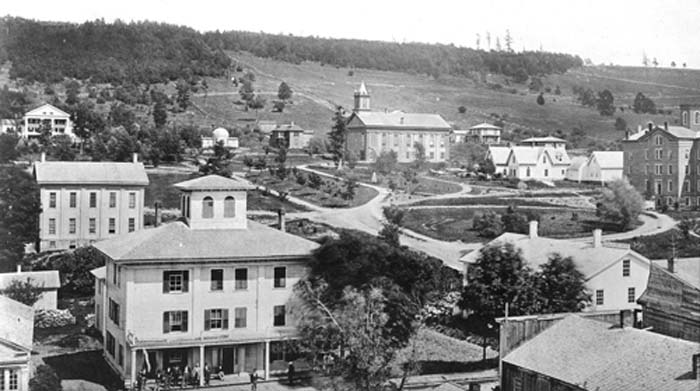
Alfred and its university in the mid 1870s. White building in foreground is the Burdick Hotel. Dome of Alfred University’s first astronomical observatory and the school’s Greek-revival chapel—now the admissions office (Alumni Hall)—can be seen in the middle distance.
There were many Burdicks living at the time in Alfred, and a hotel proprietor of that name offered “good accommodations for both man and beast, terms reasonable.” The Williams & Titsworth emporium, “over Coon’s Book Store, Alfred Centre,” sold white shirts for $1, while Mrs. E.J. Potter, dealer in “Millinery and Ladies’ Furnishing Goods,” on University Street, urged students and residents to “please call and examine.” And in a village in which outhouses accounted for sanitary arrangements and wells for water, Burdick & Green’s Hardware Store, on Main Street, stocked a supply of “eavetroughs” (roof gutters) to “furnish cisterns with good soft water” while protecting “walls from being thrown down by water freezing against them, which is a source of great annoyance.”
In its editorial columns, The Alfred Student’s lead article extolled Alfred University’s pioneering support for the cause of coeducational schooling. The piece argued that instead of “shutting [a girl] apart” or by teaching a boy that “rudeness and selfishness are manly qualities,” joining them in the common enterprise of education resulted in “natural diversity and a richer character—a quick perception of mutual proprieties, delicate attention to manly and womanly habits…a higher and purer tone of morality.”
Elsewhere, the paper urged adoption of the metric system of measurement. We’re told also that Dartmouth College had raised its tuition and that one of its faculty members, a Professor Dimond, “died of brain disease.” At Alfred University, meanwhile, instruction was reported to be available in classical, scientific and teachers’ courses as well as in theology, the school having been founded by the breakaway sect of New England Baptists who observed Saturday, rather than Sunday, as the biblically enjoined day of rest and worship. Also offered was course work in industrial mechanics and in the leading communications wonder of the era, telegraphy.
The paper noted that tuition and “incidentals” came to $11 for each of the year’s three academic terms: fall, winter and spring. Board was priced at $30 to $40, room $3 to $6. The school assessed students $3 to $6 for “fuel” and $2 to $3 for “washing.” Mention was made that “rooms for ladies are furnished and carpeted” and that off-campus housing could be obtained from private families
One item jarred. It ran under the heading “Plain Language Concerning a Recent Unpleasantness.” A casual yet singularly stupid buffoonery of rhymed couplets, blatantly racist in idiom and tone, the piece had been reprinted—without critical comment or disclaimer—from Princeton’s student newspaper, The Princetonian.
It later surfaced in another college publication, The Chronicle of the University of Michigan, as “the song of five juniors at Princeton who objected to having a colored man sit behind them in class.
What was so surprising about the item is that Alfred University and its Seventh Day Baptist founders had been in the forefront of agitation for ending slavery. The radical abolitionists Ralph Waldo Emerson and Frederick Douglass had lectured at the school. Before and during the Civil War, local church members, historically associated with the cause of emancipation, aided runaway slaves escaping to Canada on the so-called “underground railroad.” And in the spring of 1861, the nine male members of Alfred’s senior class heeded President Lincoln’s call for volunteers to fight for restoration of the Union. Moved by patriotism and religious fervor, they enlisted in two of the infantry regiments then forming in New York
In their classic survey, “The Growth of the American Republic,” historians Samuel Eliot Morison and Henry Steele Commager contended that Lincoln’s 1863 Emancipation Proclamation had been “potentially more revolutionary in human relations than any event in American history since 1776.” The authors went on to say that the document had, in a very real sense, “lifted the Civil War to the dignity of a crusade.”
Yet make no mistake. Emancipation may have ended slavery; it did not end the racism that grew out of slavery in a national polity undergoing the strains of post-war reunification
“Lincoln’s own state of Illinois barred newly freed slaves from settling [there] in 1863,” notes Gary Ostrower, professor of history at today’s Alfred University
“I’d be surprised,” he added, “if some Alfredians…were not influenced by popular racist attitudes during the post-war years.”
– Alan Littell
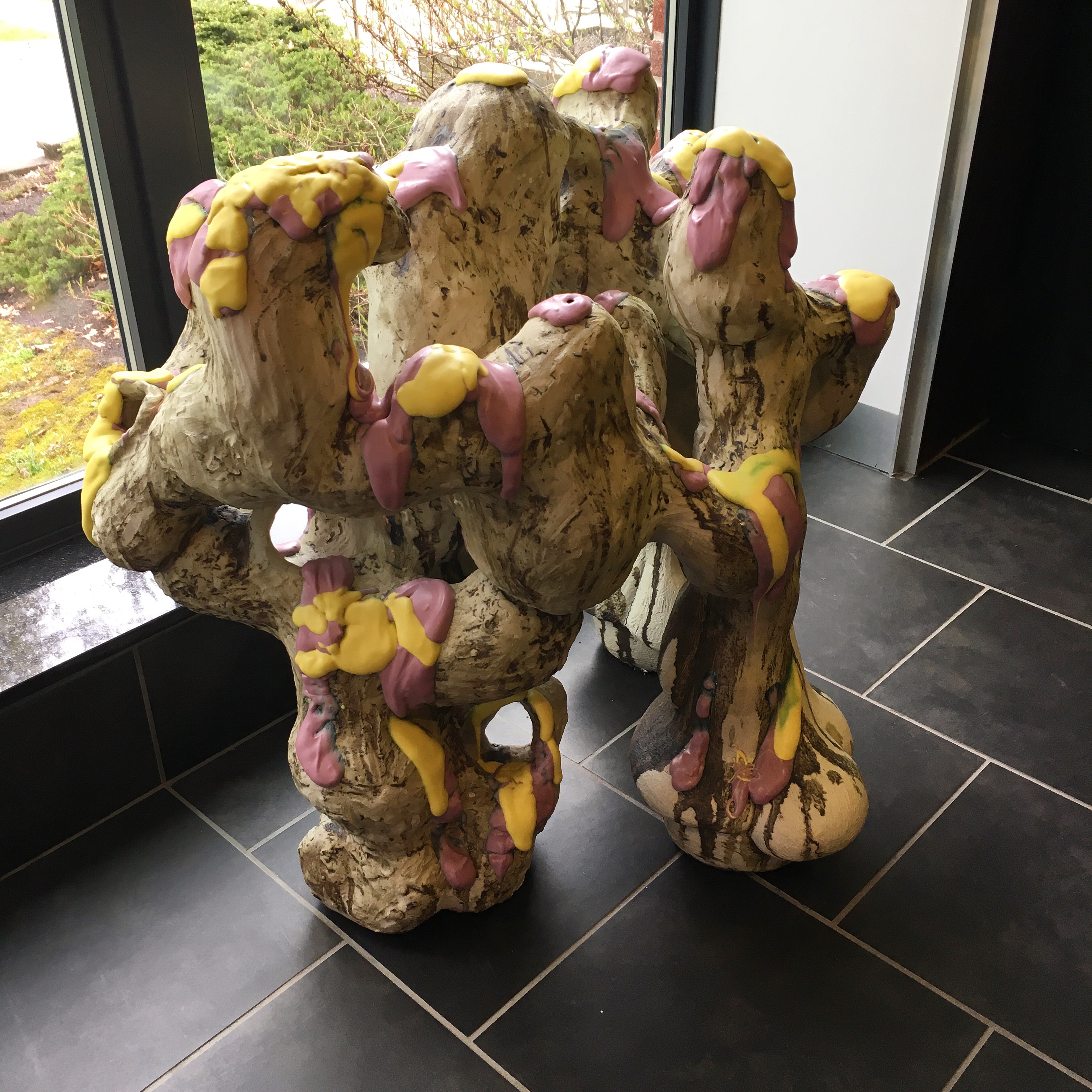
Junior ceramic work on display in Herrick
Herrick Library was honored to display work from Professor Linda Sormin’s junior ceramics students this semester. The work will come down soon, so if you want to see it in person hurry on over to Herrick!
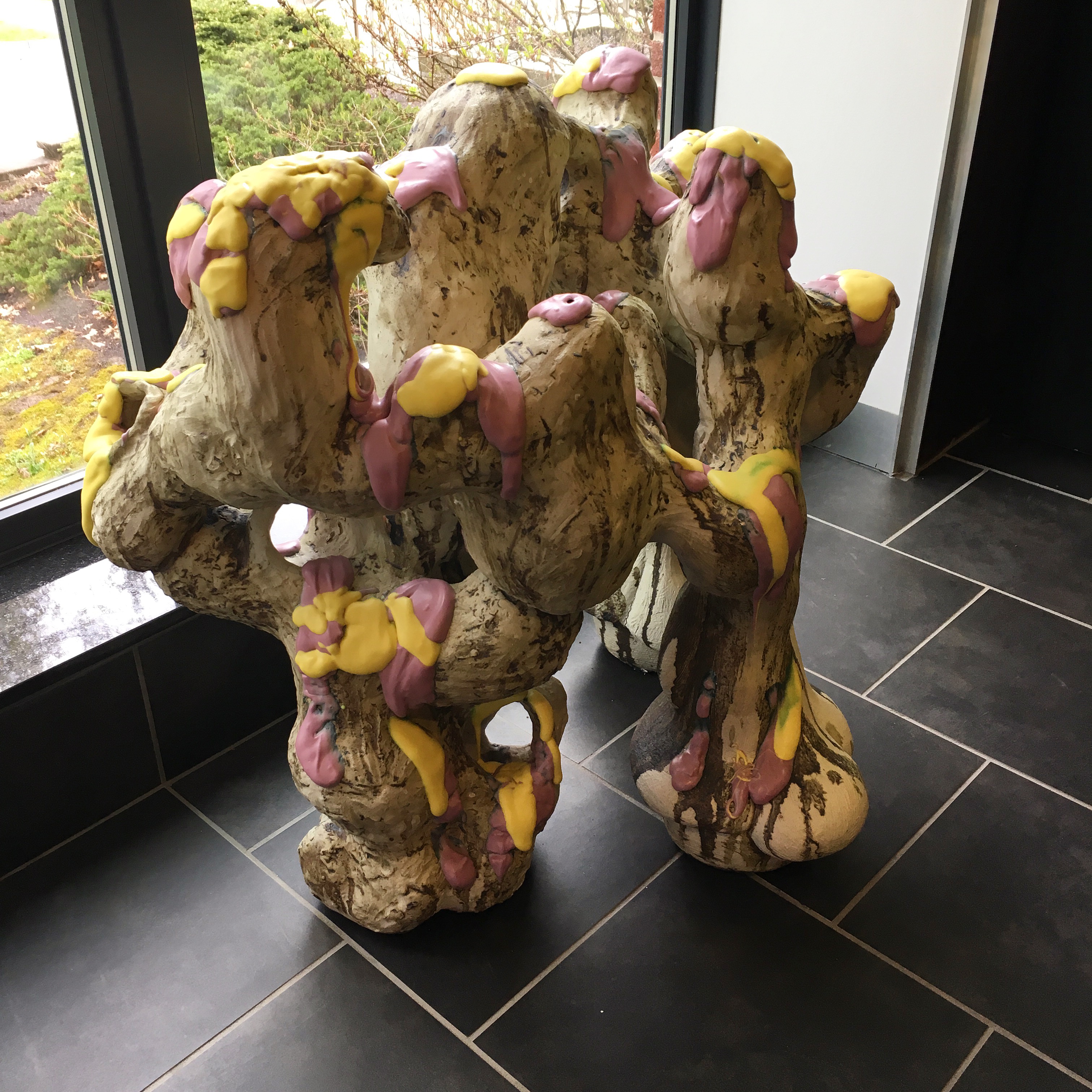
Emotional Rollercoaster, Jackie Fisher
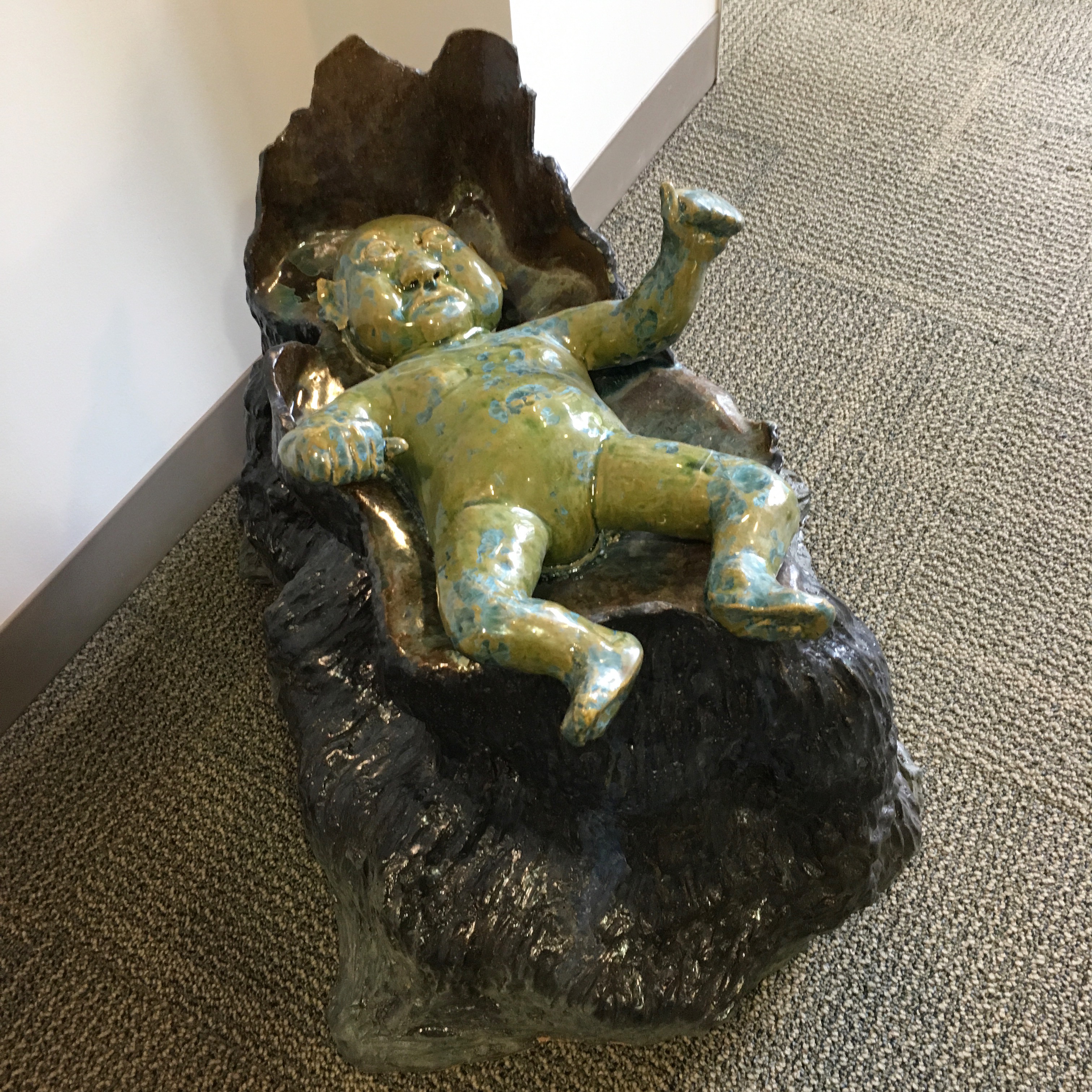
Changling: Child in Peril, Christina Rhodes
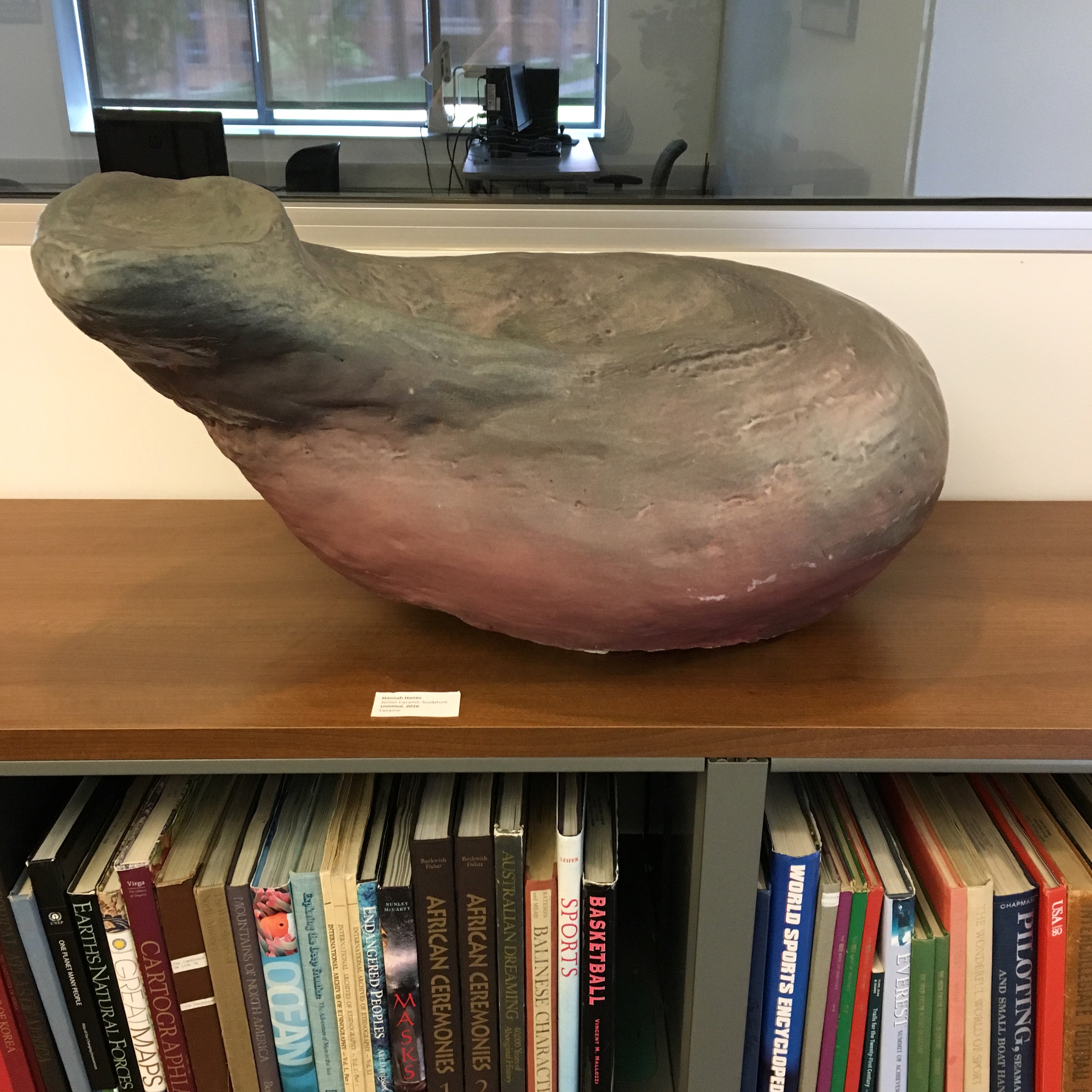
Untitled, Hannah Hones
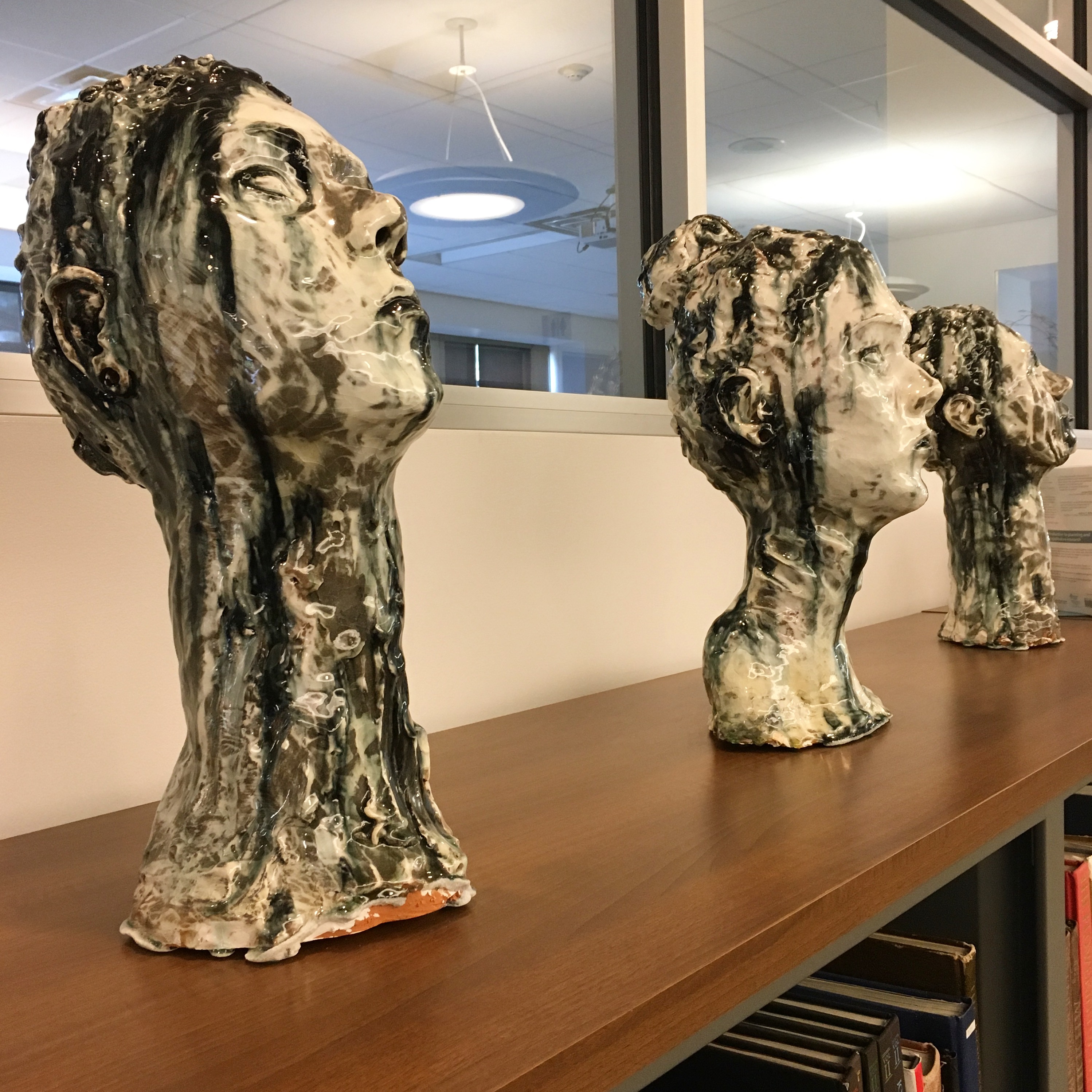
Dignified Distortion (series of three heads), Corran Shrimpton
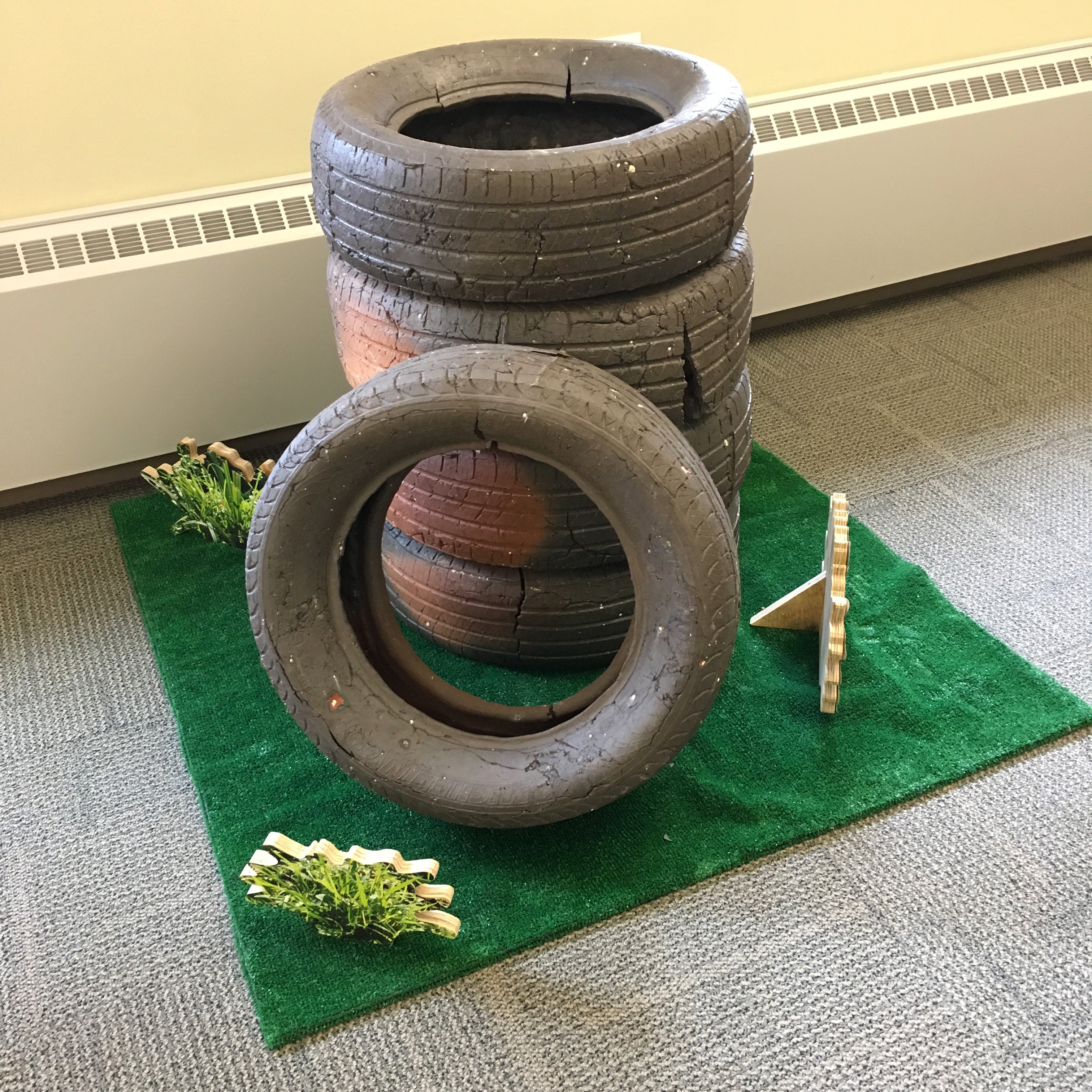
Michelin Meadow, Matt Watterson